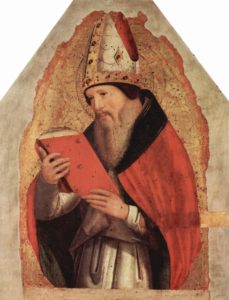St. Augustine: Sanctity during Societal Collapse!
NEW MINI-COURSE starts Mercy Sunday! April 24th
$99 for 4 classes on St. Augustine
Enroll today! (Can’t attend live? Free access to class videos when you enroll!) Choose “MINI” from dropdown pay menu…
St. Augustine was the most important theologian of the first thousand years (after St. Paul). Like Paul, before he became a great saint, he was a great “sinner” who had nothing but contempt for Christianity. We learn all this from his work, The Confessions, in which Augustine not only vividly relates the tale of his conversion, but imaginatively creates the genre of autobiography.
Born in 354 of a Christian mother, Monica, and a pagan father, Patricius, Augustine was raised in Roman North Africa, in what is today Tunisia. In the restlessness of his youth he both fathered a child out of marriage (likely with a slave) and left his mother’s Catholicism for the cult of Manichaeism. Teaching that all matter was evil, these quasi-Christians were considered “heretics” [see Chapter 16] by the Catholic bishops because they rejected the Church’s teachings on the redeeming features of the human body: denying both the bodily Crucifixion and Resurrection of Christ, as well as rejecting marriage and childbearing in favor of artificial methods of contraception (pharmakeia). Such a religion was suited to Augustine’s temperament; he infamously prayed to God to one day grant him the gift of chastity, just “not right now.” But after finding Manichaeism intellectually unsatisfactory, the precocious Augustine soon counted himself a Platonist, a follower of the ancient Greek philosopher as interpreted by Augustine’s near-contemporary, Plotinus (205-270). Neo-Platonists, after all, like their Gnostic-Manichaean counterparts, also emphasized the soul over the body.
Augustine became a successful teacher of rhetoric, the art of persuasive speech practiced by lawyers and politicians. He must have been persuasive indeed, for he soon attached himself to the imperial court in Milan (leaving his mother and the mother of his child without a clue as to his actual whereabouts!)…
The Story continues–in class!